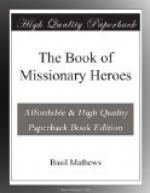One after another the great heroes sail out across strange seas and penetrate hidden continents each with a torch in his hand.
Livingstone, the lion-hearted pathfinder in Africa, goes out as the fearless explorer, the dauntless and resourceful missionary, faced by poisoned arrows and the guns of Arabs and marched with only his black companions for thousands of miles through marsh and forest, over mountain pass and across river swamps, in loneliness and hunger, often with bleeding feet, on and on to the little hut in old Chitambo’s village in Ilala, where he crossed the river. Livingstone is the Coeur-de-Lion of our Great Crusade.
John Williams, who, in his own words, could “never be content with the limits of a single reef,” built with his own hands and almost without any tools on a cannibal island the wonderful little ship The Messenger of Peace in which he sailed many thousands of miles from island to island across the Pacific Ocean.
These are only two examples of the men whose adventures are more thrilling than those of our story books and yet are absolutely true, and we find them in every country and in each of the centuries.
So—as we look across the ages we
“See the race of hero-spirits
Pass the torch from hand to hand.”
In this book the stories of a few of them are told as yarns to boys and girls round a camp-fire. Every one of the tales is historically true, and is accurate in detail.
In that ancient Greek relay-race the prize to each winner was simply a wreath of leaves cut by a priest with a golden knife from trees in the sacred grove near the Sea,—the grove where the Temple of Neptune, the god of the Ocean, stood. It was just a crown of wild olive that would wither away. Yet no man would have changed it for its weight in gold.
For when the proud winner in the race went back to his little city, set among the hills, with his already withering wreath, all the people would come and hail him a victor and wave ribbons in the air. A great sculptor would carve a statue of him in imperishable marble and it would be set up in the city. And on the head of the statue of the young athlete was carved a wreath.
In the great relay-race of the world many athletes—men and women—have won great fame by the speed and skill and daring with which they carried forward the torch and, themselves dropping in their tracks, have passed the flame on to the next runner; Paul, Francis, Penn, Livingstone, Mackay, Florence Nightingale, and a host of others. And many who have run just as bravely and swiftly have won no fame at all though their work was just as great. But the fame or the forgetting really does not matter. The fact is that the race is still running; it has not yet been won. Whose team will win? That is what matters.
The world is the stadium. Teams of evil run rapidly and teams of good too.




